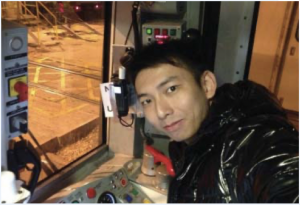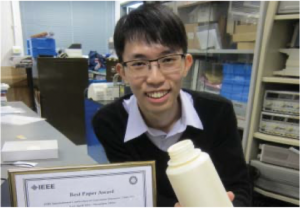Bachelor of Science with Honours in Electronics (BSCHE)
Distance Learning Mode Part-time
This programme provides comprehensive knowledge of a wide range of electronic principles, practical skills in electronics and the capacity to analyse and synthesize circuits and devices. The Honours programme gives students the opportunity to specialize in certain areas of electronics, and includes training in independent project work. Graduates are qualified to embark on a career as an electronic design engineer, analyst or consultant.
Professional recognition
IEEE Holders of BSc/BSc (Hons) in Electronics are recognized by the Institute of Electrical and Electronics Engineers, Inc. (IEEE) as meeting the educational requirement of IEEE membership.
Programme Structure
Official BSCHE Programme Regulation
- Students pursuing this programme must successfully complete at least 160 credits as follows:
The programme regulations and the courses on offer are subject to revisions. Follow the requirements exactly. Email us for consultation.
Table a. 20 credits from courses:
| Code | Title | Credits | Level |
|---|
| BUS B103 # | English and Communications for Business I | 5 | Foundation |
| MATH S121 ^ | A Foundation in Pure Mathematics | 10 | Foundation |
| MATH S122 ^ | A Foundation in Applied Mathematics | 10 | Foundation |
| SCI S121 | A Foundation Course in Physics and Chemistry | 10 | Foundation |
| ENGGS228 # | Engineers in Society | 5 | Middle |
(#) Students in the BSc with Honours programme intending to apply for membership of professional engineering societies are advised to take BUS B103 and ENGG S228.
(^) Students who are weak in mathematics are strongly advised to take either MATH S121 or MATH S122.
Table b. 50 credits of compulsory courses:
| Code | Title | Credits | Level |
|---|
| ELEC S222 | Electronics Principles and Digital Design | 10 | Middle |
| ELEC S225 | Analogue Circuits | 10 | Middle |
| MATH S221 | Mathematical Methods | 10 | Middle |
| MATH S222 | Mathematical Models with Applications | 10 | Middle |
| PHYS S271 | Discovering Physics | 10 | Middle |
Table c. 20 credits from course:
| Code | Title | Credits | Level |
|---|
| ELEC S323 * | Information Theory and Digital Communications* | 10 | Higher |
| ELEC S334 * | Signal Processing and Multimedia Technology | 10 | Higher |
| ENGG S356 * | Engineering Small Worlds: Micro and Nano Technologies | 10 | Higher |
| MECH S395 * | Mechatronics | 10 | Higher |
Table d. 20 credits from courses:
| Code | Title | Credits | Level |
|---|
| ELEC S402 | Electronics Project Course | 20 | Higher |
Table e. 10 credits from courses:
| Code | Title | Credits | Level |
|---|
| COMP S201 | Computing Fundamentals with Java | 10 | Middle |
| COMP S258 | Computer Programming and Problem Solving | 10 | Middle |
| COMP S260 | Computer Architecture and Operating Systems | 10 | Middle |
| ELEC S212 | Network Programming and Design | 10 | Middle |
| ELEC S224 | Computers and Processors | 10 | Middle |
| COMP S311 | Advanced Java Programming and Mobile Application Development | 10 | Higher |
| COMP S356 | Software Engineering and Project Management | 10 | Higher |
| COMP S359 | Relational Databases: Theory and Practice | 10 | Higher |
Table f. 10 credits from courses:
| Code | Title | Credits | Level |
|---|
| DESN S217 | Design Essentials | 10 | Middle |
| DESN S364 | Fundamentals of Interaction Design | 10 | Higher |
| MATH S365 | Graphs, Networks and Design | 10 | Higher |
Table g. 10 credits from courses:
| Code | Title | Credits | Level |
|---|
| ENGG S228* | Engineers in Society | 5 | Middle |
| MGT B240 | Principles and Practices of Management | 5 | Middle |
| MGT B344 | Theory and Design of Organizations | 5 | Higher |
| MGT B345 | Managing in Organizations | 5 | Higher |
| TC S319 | Quality Management for Science and Technology | 5 | Higher |
| TC S409 | Safety and Reliability for Science and Technology | 5 | Higher |
Notes: Courses marked with an asterisk (*) appear in several lists but can only be taken ONCE.
h. additional courses, as necessary, from any Foundation, Middle or Higher level courses offered by the University, provided that, of the total 160 credits, no more than 40 are gained at Foundation level.
Students are required to complete 160 credits but they may opt to graduate with the Bachelor of Science in Electronics [BSCE] (120 credits) after completing the required number of credits and fulfilling the requirements of the programme regulations.
Choosing the first courses to get started
Students should consider initially registering for one of the following foundation level courses, which count towards qualification.
- MATH S122 A Foundation Course in Applied Mathematics or MATH S121 A Foundation Course in Pure Mathematics
- SCI S121 A Foundation Course in Physics and Chemistry
Admission Requirement
Admission is open to anyone in Hong Kong over the age of 17.
Course Scheduling
Most computing core courses are offered in the Autumn term, and a few are offered in the Spring term. Refer to the following links for the details.
University’s Course Schedule List of Course Offer in the Coming Term
Credit Exemption
Students with recognized qualifications such as Higher Diploma or Associate Degree may be granted credit exemption.
- Holders of local recognized HD/AD in computing should apply through the BSCHE1 pathways.
- Holders of Certificate in Aircraft Maintenance Engineering from HKMU should apply through BSCHE2 pathways.
Enquiries
For enquiries about the programmes, please contact:
Dr Kevin Hung 熊景輝博士
Tel: 3120 2603
Email: khung@hkmu.edu.hk
Dr Wilson Chu 朱翰為博士
Tel: 3120 2614
Email: wchu@hkmu.edu.hk
















